A public inquiry into the Manchester Arena bombing began today (Monday, 7 September) with a tribute to the victims.
Twenty-two people died in the terrorist attack, including Angelika and Marcin Klis from York.
As it opened, loved ones of those murdered stood in silent remembrance as their names were recited.
Later the inquiry was told that experts believed opportunities were missed to identify Salman Abedi as a suicide bomber before he detonated his explosives.
Abedi, 22, was reported to police and security as acting suspiciously in the minutes before he detonated his bomb on 22 May 2017, the inquiry heard, but no action was taken.
One member of the public spotted Abedi, wearing a large back pack and thought he was praying, less than an hour before he detonated his bomb at 10.31pm and another told a British Transport Police (BTP) officer.
Paul Greaney QC, counsel to the inquiry, said experts had been asked to look into the security at the arena that night.
Mr Greaney said that “of considerable importance, the experts consider, on the basis of the information currently available to them, that, on May 22, there were missed opportunities to identify Salman Abedi as a threat and take mitigating action.”
Potential missed opportunities

Mr Greaney said that the experts concluded: “If the presence of a potential suicide bomber had been reported, it is very likely that mitigating actions would’ve been taken that could have reduced the impact of the attack.
“This is because there was sufficient time between Abedi first being spotted by, and also reported to (security) staff and his attack to effectively react.”
Mr Greaney said: “The evidence about these potential missed opportunities will need to be considered with the greatest possible care.”
He said whether there were “missed opportunities” to prevent the attack or reduce its deadly impact would be a key consideration for the inquiry, which is taking place at Manchester Magistrates’ Court.

Sir John Saunders, a retired High Court judge, is leading the probe examining events before, during and after the attack at the end of an Ariana Grande concert.
Abedi, surrounded by a throng of elated youngsters leaving the show, exploded his shrapnel-packed rucksack bomb, sending thousands of nuts and bolts shredding everything in their path.
Summarising the evidence at the beginning of the inquiry process, Mr Greaney described how William Drysdale spotted Abedi in the City Room of the arena and a second witness with Mr Drysdale then approached a British Transport Police (BTP) officer
The officer cannot recall the conversation, the hearing was told.
Two more witnesses, known only as A and B, a couple who had taken their daughter to the concert, also saw a man matching Abedi’s description acting suspiciously.
Mr A spoke to a Mohammed Agha, an employee of Showsec, the firm which provided security to the Arena on behalf of the venue’s owners, SMG.
Mr A spoke to Mr Agha at 10.14pm, some 17 minutes before the detonation.
Mr Agha then spoke to a colleague, Kyle Lawler, about the matter, eight minutes before the bomb went off.
But neither security control, nor anyone else, was informed about the suspicious activity, the hearing was told.
Searching for the truth

Earlier, formally opening the inquiry, Sir John said: “This is an exercise in establishing the truth.
“If I conclude things went wrong then I shall say so, but we are not looking for scapegoats. We are searching for the truth.
“The explosion killed 22 people, including children, the youngest was eight years old.
“Salman Abedi blew himself up in the explosion but he intended as many people as possible would die with him.”
Sir John said some evidence must be heard in secret to prevent further similar terrorist attacks.
Abedi was known to the security services, and a senior MI5 officer, known only as witness J, is expected to give evidence to the inquiry later this year.
Brother jailed for life

The bomber’s brother, Hashem Abedi, now 23, was last month jailed for life with a minimum 55 years before parole, for his part in the deadly bomb plot, which left hundreds of other people injured.
Some evidence, involving information judged to be potentially of use to terrorists, is subject to restriction orders, and those hearings will be closed to the public.
The most sensitive evidence is likely to be heard at closed hearings, with both press and public excluded because of the risk to national security.
The inquiry is scheduled to run into spring.
The 22 victims

The names of the 22 victims were read aloud: Elaine McIver, 43, Saffie Roussos, eight, Sorrell Leczkowski, 14, Eilidh MacLeod, 14, Nell Jones, 14, Olivia Campbell-Hardy, 15, Megan Hurley, 15, Georgina Callander, 18, Chloe Rutherford,17, Liam Curry, 19, Courtney Boyle, 19, Philip Tron, 32, John Atkinson, 26, Martyn Hett, 29, Kelly Brewster, 32, Angelika Klis, 39, Marcin Klis, 42, Michelle Kiss, 45, Alison Howe, 45, Lisa Lees, 43, Wendy Fawell, 50 and Jane Tweddle, 51.
Angelika and Marcin Klis from York
